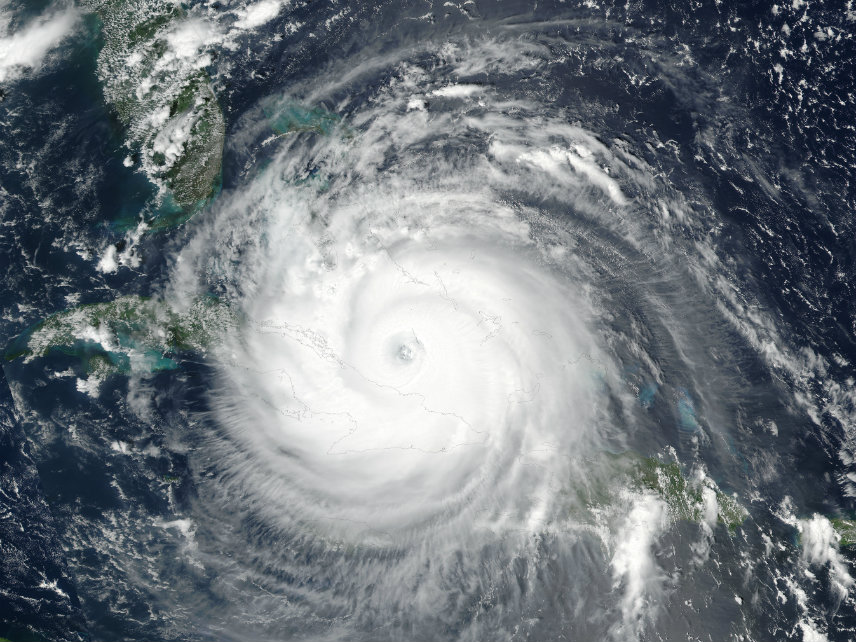As Hurricane Irma Bears Down on Florida, the Broken Window Fallacy Is Back
Say it with me: natural disasters are not good for economic growth.

With Hurricane Irma bearing down on the southeastern United States this weekend, cue another round of economic illiteracy from pundits and officials who will try to argue that all those flooded homes, torn-off roofs, and broken windows are actually a good thing for the economy.
The latest culprit of such misinformation is someone who should probably know better: William Dudey, president of the Federal Reserve Bank of New York.
In an interveiw with CNBC on Friday, Dudley trotted out of the ol' broken window fallacy in an effort to find a silver lining to Irma's impending, potentially devastating landfall in Florida.
"The long-run effect of these disasters unfortunately is it actually lifts economic activity because you have to rebuild all the things that have been damaged by the storms," Dudley said. "I would expect that by the time we get to the end of the year and early 2018, the transitory negative effects of this storm I think will be over and we actually will start to see some of the benefits of the rebuilding efforts in terms of boosting the economy."
As a clearly exasperated Michael Tanner, a senior fellow at the Cato Institute, asked this week in response to similar arguments made in the wake of Hurricane Harvey's assault on coastal Texas: "Do we really need to say it? Hurricanes are bad."
Harvey rained down an estimated $20 billion in property damage (and incalculable amounts of human suffering, including at least 70 deaths) on Texas, and Irma is poised to be perhaps worse. The storm is one of the strongest ever recorded in the Atlantic basin, bringing winds of up to 150 MPH with it as it takes aim at Florida.
According to the National Weather Service, Irma made landfall in the Florida Keys on Sunday morning. The storm is forecast to strafe the western coast of Florida, with a second landfall possible in the vicinity of St. Petersburg or Tampa. Early estimates say the storm might cause more than $200 billion in damage.
If you're only looking at GDP data, sure, storms like Harvey and Irma might cause a temporary uptick in spending as people and businesses repair and rebuild. But that's not economic growth; it's just replacing what's been lost. Those resources could have been allocated in different, more productive ways if they hadn't been forced to be used rebuilding after a natural disaster.
In his piece this week, Tanner explains the so-called "broken window fallacy," first explained as an economic parable by 19th Century French economist Frédéric Bastiat:
In Bastiat's parable, a shopkeeper's careless son breaks a pane of glass in his father's store. According to the economic theory popular at the time, the broken window was actually a good thing, because it meant that the shopkeeper would have to pay the glazier to repair it. The glazier then would use his new income to buy a pair of shoes, and the shoemaker would spend the money, etc. The cycle continues, and the economy is stimulated. As Bastiat noted, "You come to the conclusion, as is too often the case, that it is a good thing to break windows, that it causes money to circulate, and that the encouragement of industry, in general, will be the result of it."
Nevertheless, as Bastiat pointed out, that leaves out a crucial calculation: what the shopkeeper would have done with the money if he had not been obliged to buy a new window. What the broken-window advocates miss is the elements that are not seen: "It is not seen that as our shopkeeper has spent six francs upon one thing, he cannot spend them upon another," The accident only means that the shopkeeper has spent six francs to bring himself back to the economic state he was in before the window was broken; he is no richer for it, but six francs poorer.
Texas and Florida stand to be much less than six fancs poorer by the time this hurricane season is over. Harvey and Irma have the potential to pack a one-two punch unlike anything the United States has ever seen, and the damage caused by these two storms is anything but a blessing in disguise.
You might expect the chairman of a federal reserve bank to have a better grasp of economics—but, then again, you might expect the same of a Nobel prize-winning economist, and that's never stopped Paul Krugman from touting the benefits of broken windows, either.


Show Comments (61)